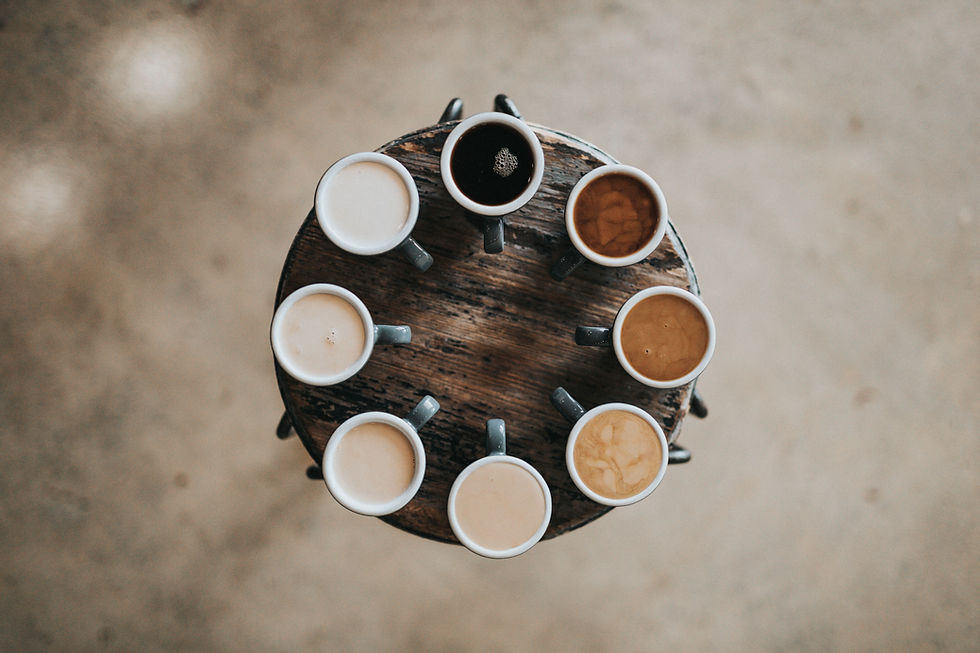Caffeine, good or bad?
- Awesome Oranges
- Jun 10, 2021
- 2 min read
Updated: Jun 28, 2021

Caffeine is a natural stimulant found in drinks like coffee, tea, and energy drinks. Many people depend on these drinks to 'wake them up in the morning, but what else can caffeine offer?
In an 8-ounce (240-mL) serving, about this much caffeine is expected (mg);
Espresso: 240–720 mg
Coffee: 102–200 mg
Yerba mate: 65–130 mg
Energy drinks: 50–160 mg
Brewed tea: 40–120 mg
Soft drinks: 20–40 mg
Decaffeinated coffee: 3–12 mg
Cocoa beverage: 2–7 mg
Chocolate milk: 2–7 mg
In the past, caffeine has had a bad reputation. However, there are increasingly more studies that show the benefits of caffeine intake on a controlled basis, such as boosting metabolism, enhancing brain function, and preventing memory associated diseases such as dementia and Alzheimer's.
Let's first understand how caffeine affects our bodies, more specifically, our brains. It's a no 'brainer' that caffeine helps us to stay awake. How? Once caffeine is ingested, it is quickly absorbed in the bloodstream and broken down into compounds that can inhibit signalling from other body organs. For example, caffeine acts as an inhibitor to adenosine, a neurotransmitter that relaxes the brain and makes you feel tired. Adenosine builds up during the day, making you sleepy at the end of the day. However, caffeine inhibits adenosine receptors, which makes it impossible for your brain to detect 'tiredness.' What's more, blood adrenaline levels and increase brain activity of the neurotransmitters dopamine and norepinephrine, which provides you with a 'rejuvenated' feeling, or simply on a 'sugar high' feeling.
Therefore, caffeine can solve mood swings and increase efficiency during work time when feeling particularly tired. However, the saying 'the more, the better does not go for caffeine. Instead, the second cup of coffee may not have the same benefits for your body as the first, as your body cannot absorb so many nutrients at once, and instead may lead to an increased desire for caffeine to stay awake next time.
Furthermore, as caffeine stimulates different organs such as the central nervous system, your metabolism can increase up to 11% and fat burning by up to 13% after drinking coffee. Therefore, if consuming 300 mg of caffeine per day is equivalent to burning an extra 79 calories. That is, if you do not add any extra sugar and cream into your coffee or drink a latte to increase caffeine, that will add excess calories to your drink, decreasing its benefits immensely.
However, one should prevent excess intake as it may lead to side effects such as anxiety, restlessness, tremors, irregular heartbeat, and trouble sleeping. Hence, the U.S. Department of Agriculture (USDA) and the European Food Safety Authority (EFSA) consider a daily intake of 400 mg of caffeine safe. This amounts to 2–4 cups of coffee per day, maximum. Although, this is purely black coffee.
So, stay healthy, and try to drink your caffeinated drinks without all extra sugar and cream. Or try a sugar substitute such as the natural sugar derived from monk fruit (as mentioned in the previous post)!




Great to know that my favourite drink has so many health benefits! Thanks!